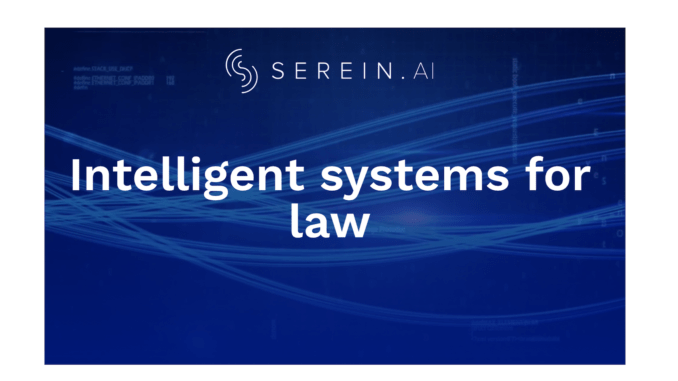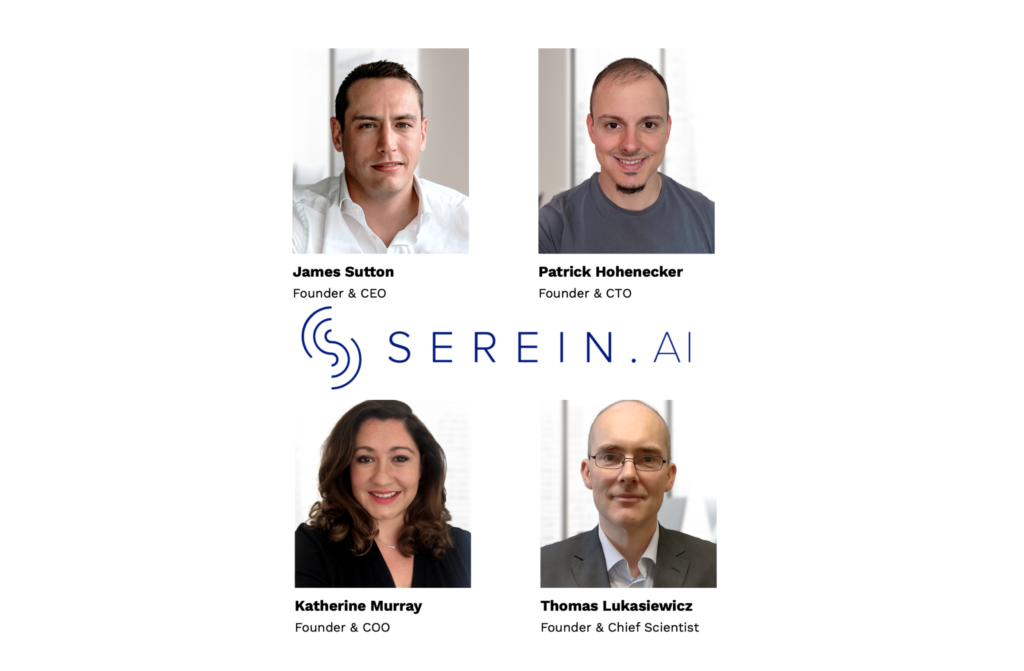
Serein AI is a new legal tech company focused on advancing Natural Language Processing (NLP) in the legal field and beyond, created by four founders – two from the law, two from academia. It’s now part of Allen & Overy’s latest FUSE cohort. Artificial Lawyer caught up with the team to find out some more.
First of all, what is Serein trying to do? Put simply, and after talking to two of its founders, James Sutton (CEO) and Patrick Hohenecker (CTO), the startup is trying to make NLP more immediately useful through deep-learning so that there is less need for users to manage machine learning. I.e. using their NLP review system would not need to involve a ton of user input to make it effective.
Their ‘plug and play’ goal of course may sound easy, but more than a dozen NLP-focused companies in the legal space have been working here for some years and not reached such perfection yet. Even those companies that provide ‘pre-sets’, i.e. software kits that are pre-trained to be used on certain types of documents, often require some additional machine learning and fine-tuning by the people using them.
Overall, NLP has proven that it works, that it can massively reduce fee-earner input on review tasks, especially on high volume or high frequency matters, but a system where you simply drop in any document you like and can then start analysing and getting super-accurate answers back instantly with little to no training on your part, remains a hard problem. And this is because human language, even the more narrow milieu used by lawyers, is so complex and so full of variation in meaning.
The goal goes beyond legal as well. As Sutton and Hohenecker explained, the aim is also to provide text analysis and the ability to provide answers to questions about what are in not just legal documents, but unstructured data repositories such as company and financial reports, and other key commercially important documents.
All in all it’s an ambitious goal – but then, without new companies with the ambition to make things better we’d have never got to where we are today, where using NLP tools for review is now ‘normal’ for larger commercial firms. So, can Serein succeed as a ‘Next Generation’ legal AI company and take things further?

To answer that question we need to look at the team and how it came together. As noted, this is a marriage of two parts: law and academia.
On the law side is Sutton, who also runs Avantia Law – a new Legal Services Business (LSB) focused on high volume tasks. Previously he was a GC at asset management company, Sculptor, and prior to that was an associate at elite LSB, Slaughter and May.
Also on the law side is Katherine Murray (COO), who also co-founded Avantia Law and previously worked at another elite LSB, Debevoise & Plimpton, and also Slaughter and May.
On the academic and tech side we have Thomas Lukasiewicz, who is a leading professor of Computer Science with a focus on AI and machine learning at Oxford University. He is also head of the Intelligent Systems Lab at the Department of Computer Science there, and a Turing Fellow of The Alan Turing Institute. In short, if you’re going to have a Chief Scientist in a company focused on NLP then this is a very good choice.
And also, Hohenecker, who is just finishing his PhD at Oxford, and is also focused on the latest aspects of NLP and machine learning.
The two groups met last year at – by chance – a conference where Artificial Lawyer’s founder was also speaking. They got chatting about NLP and its big challenges, and very soon after Serein was born.
OK, so that’s the key info. Let’s hear from Sutton and Hohenecker.
‘At the moment we are very much in the R&D phase, and taking the techniques developed by Thomas and applying them to [unstructured data] problems,’ Sutton explained. ‘We are in no rush.’
Fundamentally, he added, there has to be ‘smarter ways to find information in contracts’ than we do today. I.e. as noted above, build a system that has a much more ‘general NLP’ capability.
‘The next evolution [in this field] is removing the training requirements,’ Sutton added.
Hohenecker added that the goal is what he called ‘transfer learning’ i.e. having trained their NLP with deep learning on massive data sets, they can then apply the software to more narrow use cases, such as specific types of legal documents.
Or, as he explained: ‘You start with a big set of data, then try and fine tune to a smaller data set.’
He noted that legal language has a smaller overall vocabulary than general speech, it’s more formulaic and sentence structures repeat. The goal then is – and this is no small thing… – to get to a more general language capability and apply it to what should be a less varied set of text to then understand.
They don’t want to go much further into the technical details of how they propose to get to this Holy Grail of NLP, as they don’t want to show their hand too early, which is understandable.
And is Allen & Overy a key part of this project? They said that ‘it’s a great place to start’, but for now it’s just going to be all about research and testing what they have built so far.
So, what next? They want to build out their research team, but they added the company is not in need of money right now, as they are already ‘well-backed’ and have had some early investment – although they won’t say from whom.
All in all, an exciting project. If Serein could really create a more generalistic NLP system, where you can just throw any legal or commercial document you want at it, and without you having to get involved in training or quality control, and can just get super accurate answers immediately…….then that would be huge.
Of course, as Artificial Lawyer mentioned to them, if they did manage to come up with a generalist NLP system that could handle complex tasks in the way they hope, they’d probably be bought up by Google or one of the other big tech companies, and probably not spend that long in the world of legal tech.
But, we’ll see. It’s great to witness the fact that even after all this time – well, about four years – there are still multiple new legal AI companies springing up that are seeking to push the boundaries.
Good luck to the team. This site will be watching their progress with interest.